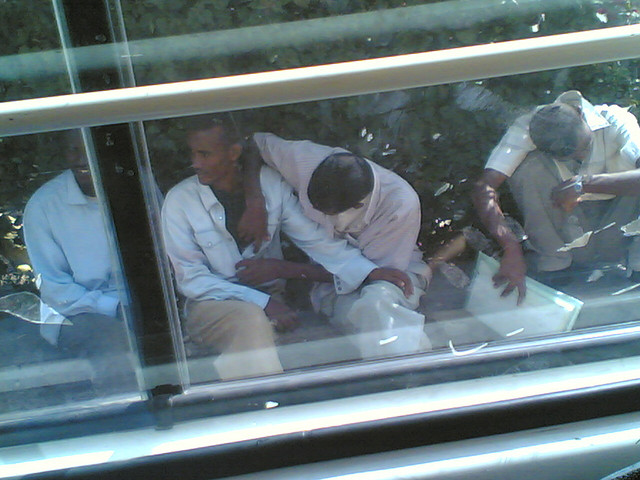
In a new burst of African homophobia, Mr. Paul Evans Aidoo, a government minister in Ghana, has drawn much national support and international condemnation after calling on the country’s intelligence services to round up Ghana’s gay population. The move by the minister follows months of campaigning by the Christian Council of Ghana calling on Ghanaians not to vote for any politician who believes in the rights of homosexuals in the upcoming elections. The comments from the National Democratic Congress (NDC) politician come in the feverish run-up to the 2012 elections and have drawn wide support from political, religious and social leaders throughout the country, such as representatives of both the Christian as well as the Muslim clergy.
Currently, Ghana’s constitution does not extend human rights or legal protection based on sexual orientation. In fact, its criminal code contains a clause prohibiting “unnatural carnal knowledge”. This ambiguous phrase reflects a pervasive homophobia cultivated across the whole society. Even Ghana’s usually fairly vocal human rights activist community seems complacent. Amnesty International Ghana Director Laurence Amesu is refusing to take a position on the law, just like Richard Quason, the deputy commissioner of the Ghana Commission on Human Rights and Administrative Justice.
The lifestyles of gay, lesbian, bisexuals and transgender people are currently listed as criminal in 38 African countries. The call from Mr Aidoo thus marks only the latest in a series of expressions of officially condoned homophobia across the continent.
Last year, the launch of a parliamentary bill in Uganda proposing the death penalty for same-sex encounters sparked a an “outing” campaign of a dozen lesbians and gay men by a Kampala newspaper. One of those named, gay rights activist David Kato, was then beaten to death with a hammer in January. The law is still under discussion in Uganda but after intense international pressure, MPs supporting it now say imprisonment rather than the death penalty would be appropriate.
In Malawi, two men who staged a partnership ceremony in December 2009 were jailed for 14 years. They were then pardoned in April 2010, but only after intense pressure from European and American aid donors. The prime ministers of Zimbabwe and Kenya, where new constitutions are under debate, have in the past year denounced homosexuality. Even South Africa, whose constitution recognizes same-sex partnerships and condemns discrimination, continues to demonstrate an uneasy relationship with homosexuality. In the past couple of years, the township practice of “corrective” gang rape of lesbians increased considerably.
A comprehensive study of global lesbian, bisexual and gay rights reveals the brutal price people pay for their sexuality around the globe. The research, which was conducted by the charity network ILGA, shows that 76 countries still prosecute people on the grounds of their sexual orientation – of which seven punish same-sex acts with death. And nations with a positive attitude towards gay rights are outnumbered by those with a negative approach. While 76 countries will imprison you if you are gay, only 58 have anti-discrimination laws that apply to sexuality, and a mere 32 countries recognize same-sex unions.
In the past, the ISN has offered regular coverage on these issues:
- You Can Run – Or You Can Hide recounts the assassination of gay rights campaigner David Kato Kisule and how homophobia in Uganda has grown even stronger in the wake of the murder.
- Many Western media outlets and human rights groups have failed to provide a proper context for understanding this new wave of homophobia. Gay Rights (and Wrongs) in Africa analyzes the complex cultural and political factors that underpin anti-gay fervor.
- The ISN Insights articles LGBT and Human Rights, providing an overview of the discrimination and persecution of gays and lesbians in Africa, and Pluralism: What Relevance for Uganda, discussing Uganda’s cultural policies and how they often result in social exclusion.
- The Podcast interview with Jason MacFarlane of JFLAG focuses on LGBT people’s fight for human rights in Jamaica.
- Our IR Directory features various organizations dealing with LGBT rights issues, such as the International Gay and Lesbian Human Rights Commission (IGLHRC).
And you will find more resources on the topic in our Digital Library.
Please also let us know if you have suggestions for additional background information on this topic.

